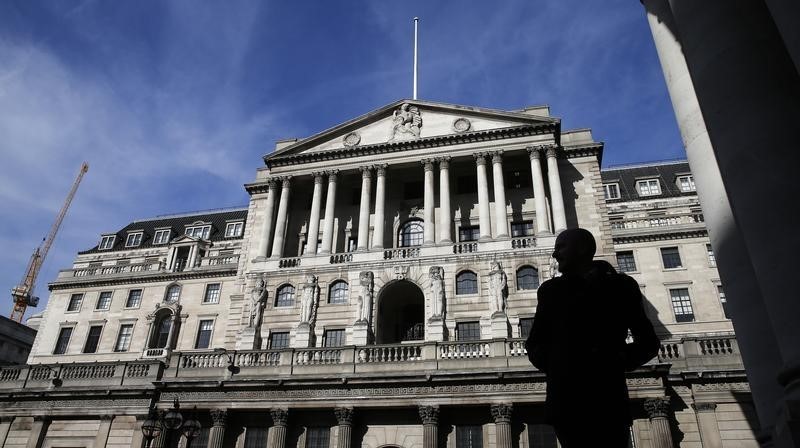By Jamie McGeever
LONDON (Reuters) - Fear of falling prices in a debt-laden world has returned to unnerve investors and central banks alike, as the slide on oil and commodity markets that set off a deflation scare last year has resumed with a vengeance.
This summer's Shanghai stock market shock is also deepening anxiety that a cooling of the Chinese economy will lead to sharply lower global growth, while weak consumer prices are undermining assumptions that U.S. interest rates will soon rise.
By this spring, the deflation scare had been fading, with investors confident the plunge in oil prices was over. They moved out of the safety of government bonds, pushing up yields in the hope that easy central bank money would gradually reflate the world economy. Victory over deflation could then be declared.
However, the Thomson Reuters Commodity Research Bureau index (TRJCRB) has plummeted 10 percent in July to its lowest level since the nadir of the global recession in early 2009.
Crucially, this benchmark index has breached the lows it hit in March, casting doubt on expectations that raw materials costs would soon cease to drag down annual consumer inflation rates.
"We're worried that the recent weakness in commodity prices could signal a loss of momentum in global growth that we're not projecting," said Bruce Kasman, global chief economist at JP Morgan in New York.
JP Morgan has yet to adjust its official projections, but Kasman said global growth in the second quarter is estimated at only 2 percent, a percentage point below his forecast at the start of the quarter.
Prolonged deflation is damaging, especially for the developed economies where household, corporate and government debt remains so high. If consumer prices fall, the real value of this debt rises, making it increasingly difficult to repay.
Consumer inflation is already near zero across the world. Even the recoveries underway in the United States, Britain and continental Europe do not seem strong enough to generate significant price pressures as economies in the emerging world, led by China, slow sharply.
This complicates - and possibly delays - interest rate rises planned by the U.S. Federal Reserve and Bank of England, which markets had assumed would happen by early 2016.
The dollar and sterling have risen in anticipation of higher rates, moves that are themselves deflationary as they lower the price of imports. "Lower goods prices and a stronger dollar could slow the Fed's path. The dollar matters," said Kasman.
MAXIMUM UNCERTAINTY
Global inflation was just 1.6 percent in the second quarter, according to JP Morgan, down from 2.0 percent at the end of last year. While it is forecast to rise throughout 2015, this assumes commodity prices and economic growth don't weaken further.
Investors are left wondering where to put their money. Like commodities, emerging markets are suffering heavy selling and rising volatility; growing caution among investors could also hurt stocks, and bonds are near their most expensive in decades.
Latest fund flow data from Bank of America (NYSE:BAC) Merrill Lynch shows investors are starting to play "deflation trades". In the week ending July 22 they dumped billions of dollars' worth of gold, commodities and emerging market assets, BAML said.
Much of the attention is on China, the world's second largest economy which kept commodity prices high during its boom years that now seem to be fading.
Shanghai stocks lost a third of their value in the three weeks to July 9 before staging a government-inspired recovery. That was shattered by an 8.5 percent plunge on Monday, the biggest one-day loss since February 2007.
Capital is flooding out of China. Net outflows totalled as much as $220 billion in the second quarter, Goldman Sachs (NYSE:GS) estimates, bringing the total in the past year to as much as $761 billion.
Bridgewater Associates, the world's largest hedge fund, reckons the impact of the financial sector on Chinese economic growth will flip from a positive 2 percent over the past year to zero or negative in the third quarter.
Last week, it issued a gloomy note on China, saying: "We are now at the point of maximum uncertainty. There are now no safe places to invest and the environment looks riskier."
This creates problems for both China's central bank and counterparts in the developed world which target inflation, such as the Fed, BoE and European Central Bank.
British inflation is zero, well short of the BoE's 2 percent target. The U.S. rate on the Fed's favoured measure is 1.2 percent, under its 2 percent target over three years. All this undermines the case for higher interest rates.
Last year's deflation scare was most acute in the euro zone, prompting the ECB to start pumping 1 trillion euros into the economy in March. In a new paper on Monday, the ECB warned that the war on deflation was not yet over.

"It remains too early to identify a turning point in underlying inflation from a statistical point of view. More data are required for the signal for such a turning point to become strong enough," the paper said.
(editing by David Stamp)